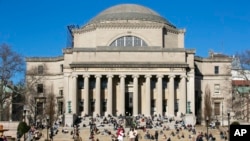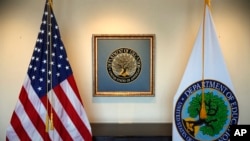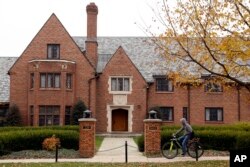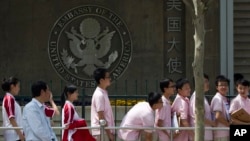Student Union
- By Pete Musto
Parents, Leaders Work to End Hazing at US Colleges

Tim Piazza and Marquise Braham told their parents they just wanted to make some new friends by joining college social groups called fraternities. Neither of them got much of a chance.
The two young men died after taking part in extreme rituals for admission into the all-male student groups. They were not even 20 years old.
Now, their parents are launching a campaign to end these rituals across the United States. They are joined by the parents of Max Gruver and Brian Kowiak, two students who died in similar ways. And they have partnered with national leaders of fraternities, and of female student social groups called sororities.
Fraternities and sororities are private social groups common to many colleges and universities in the U.S. They have a long history as part of the American higher education experience.
Parties, housing, projects
Students pay membership fees. The groups hold parties and other social events. Some offer shared housing. Members usually also must take part in community service programs. And members often help each other find jobs after they graduate.
But there is a darker side to Greek life, as involvement in fraternities and sororities is often called. The term comes from the letters of the ancient Greek alphabet the groups use to make their names.
The process of becoming a member sometimes involves what is called hazing. This is when current members force pledges, those interested in joining, to take part in dangerous, abusive or possibly illegal activities.
Last week, Piazza's father, Jim, and Braham's father, Rich, began preparing for a number of television appearances. They will use those appearances to announce their anti-hazing campaign.
"I know it might seem strange to some people that families who lost their children to fraternity hazing are now working with fraternities and sororities to eradicate hazing," Jim Piazza told the Associated Press.
"But," he added, "we will do anything that we can to save a life and to prevent another shattered family."
His 19-year-old son died last year after his fraternity "brothers" ordered him to drink a huge amount of alcohol. He became severely intoxicated. He fell repeatedly, including down stairs and into an iron fixture. It was almost 12 hours before the fraternity members called for medical help. He received treatment at a hospital, but it was too late. Tim Piazza died from his injuries.
Numerous arrests
Police arrested almost 30 members of Piazza's Beta Theta Pi fraternity at Pennsylvania State University in Centre County, Pennsylvania. All higher-level charges have been dropped. Three people have since admitted their guilt to lesser charges and one is already under house arrest.
The Piazzas have reached a settlement with the fraternity to end the civil legal action the family had sought.
Penn State student Marquise Braham, 18, killed himself in 2014. His suicide took place after a series of extreme Phi Sigma Kappa fraternity hazing rituals, about which he had protested to school officials.
Currently, the legal system — and that's the police, district attorneys and judges — "seem to view hazing as it's kind of like kids' stuff," Rich Braham said.
These fathers say they are happy to have found allies at the top of the North American Interfraternity Conference and the National Panhellenic Conference. Together, these organizations represent nearly 100 fraternities and sororities nationwide. And their leaders are ready and willing to work with Piazza and Braham.
Judson Horras is the president of the North American Interfraternity Conference. He said a first goal is of this new joint effort is to press lawmakers in all 50 states to strengthen anti-hazing laws. They want lawmakers to make it a felony to force a student to drink alcohol.
Some states reluctant
Some state governments have been slow to strengthen such laws in the past. But Horras said he believes Greek organizations can get them to change their policies.
"Keep in mind fraternities and sororities have 9.1 million students and alumni as members," Horras said. "That's part of the network we're building now to make this happen across North America."
His organization is also trying to solve the alcohol issue itself. By this time next year, he said, highly alcoholic drinks will be banned from all fraternity housing of organization members.
"We can do more together than we can alone to address this societal problem," said Carole Jones, chairman of the National Panhellenic Conference. "The fight against hazing requires that an entire community step up, including sorority women, who can and must do our part to create safer campus cultures."
The Greek life leaders also plan to have parents like Piazza and Braham speak to as many as 25,000 college students this school year. They will talk about the dangers of hazing. And members of fraternities and sororities will be asked to speak to high school and middle school students.
"We realize that it takes many years to change a culture," said Piazza. "We're not going away. We'll be here next year, the year after, the year after that."
See all News Updates of the Day
- By VOA News
International students discuss US campus culture shock

International students at De Anza College in Cupertino, California, talked about culture shock in an article in La Voz News, the student newspaper.
"It felt like a major culture shock. Everything was so different, from academics to mannerism," said a student from Mexico.
Read the full story here.
These are the most expensive schools in the US

High tuition costs along with housing and food expenses can add up for students at U.S. colleges and universities.
MSNBC looked at the most expensive schools in the country, with one costing more than $500,000 for a bachelor’s degree. (June 2024)
Uzbekistan students admitted into top US universities

Students from Uzbekistan are among the international students admitted to top colleges and universities in recent years.
Gazata.uz profiled some of the Uzbekistan students attending Harvard, Brown, Princeton and other U.S. universities. (June 2024)
- By Stella Hsu
Reports of visa checks, deportations worry Chinese STEM students in US

Geopolitical tensions and growing competition in tech between the United States and China appear to be spilling over into academia despite commitments from the world’s two biggest economies to boost people-to-people exchanges.
The United States remains the top choice for Chinese students seeking to study abroad with nearly 300,000 studying in American colleges and universities during the 2022-2023 school year. But reports of some cases that students and professors are facing extra scrutiny while passing through immigration and the deportation of others are raising concerns.
For Chen Xiaojin, a doctoral student studying semiconductor materials at a university in the Washington, D.C., metropolitan area, it has been six years since she returned to her hometown of Beijing.
At first, it was the COVID-19 pandemic that kept her from going home. But over the past two years, she has been deterred by accounts of Chinese students majoring in science and engineering being required to reapply for their visas upon returning to China.
She also says she is worried by reports over the past six months of Chinese students being deported, even at nearby Dulles Airport.
"My current research is relatively sensitive, and my boss [adviser] is getting funds from the U.S. Department of Defense, making it even more sensitive,” she told VOA. "I am afraid that I won't be able to return after I go back [to China]."
Chen says that if she did return to China, she would have to apply for a new visa.
In a report late last month, Bloomberg said it had found at least 20 Chinese students and scholars with valid visas who were deported at U.S. Customs since November and barred from reentry. The U.S. Customs and Border Protection Agency does not release relevant data.
Immigration attorney Dan Berger represented one Chinese student who was deported late last year. He tells VOA Mandarin that the student studied biological sciences at Yale University and was about to complete her doctorate.
She visited her family in China and got a new visa but was deported by customs at Dulles Airport and barred from reentering the country for five years. Berger said he did not see anything suspicious in the transcript of the conversation between the student and the customs officer.
"We have seen what seems like a pattern over the last six months of Chinese PhD students being turned around…. more than I've seen in quite a while," he said.
Matthew Brazil, a fellow at the Jamestown Foundation, said neither country seems willing to explain the situation. However, he believes that in most cases, the United States must have valid reasons for blocking visa holders from entering the country.
In some cases, the student’s background may not match what is written on the visa application. In other cases, customs agents may also find something that the State Department missed, and once they see it, they are responsible for taking action.
"I wish the Chinese side would be specific about their students who were refused entry,” he said. “The fact that both sides are mum on details and that the Chinese side is engaged with the usual angry rhetoric means that each has security concerns. And that says to me that there was good reason for the U.S. to stop these particular applicants."
Brazil also sees a connection between the entry denials and export control regulations issued by the United States in October 2022 that restrict China's ability to obtain advanced computing chips, develop and maintain supercomputers, and manufacture advanced semiconductors.
U.S. Customs and Border Protection is one of the law enforcement agencies authorized to investigate violations of export control regulations, he said.
"Beijing's intelligence agencies are known to focus attention on PRC [People's Republic of China] students and scientists headed abroad who study or work on dual-use technologies controlled under the Export Administration Act — compelling Chinese students and scientists to report on what they've learned when they return to China on holiday,” he said. “This has been true for decades."
Bill Drexel, a fellow for the Technology and National Security Program at the Center for a New American Security, said the U.S. government did find some cases where students tried to steal strategic technology for China.
"I think it would both not be surprising that they found some really questionable or incriminating evidence for some students,” he said. “It would also not be surprising if, in their hunt for really solid evidence, they also may have made some mistakes on other students.”
Drexel adds that “it’s just kind of an unfortunate fact of the time that we live in and the tactics that the CCP uses when it comes to these measures."
In a post on X in early May, U.S. ambassador to China Nicholas Burns tried to dispel concerns about visas and entry to the United States for students and scholars. In the post, he said "99.9% of Chinese students holding visas encounter no issues upon entering the United States.”
In an interview with The Wall Street Journal Monday, Burns said it is China that is making it impossible to promote people-to-people ties. Burns told the Journal that students attending events sponsored by the United States in China have been interrogated and intimidated.
He also said that since U.S. President Joe Biden and China’s leader Xi Jinping held their summit in San Francisco last year, China’s Ministry of State Security and other agencies had interfered with Chinese citizens’ participation at some 61 events.
At a regular briefing on Wednesday, Chinese Foreign Ministry spokesperson Mao Ning dismissed those accusations, saying that they did not “reflect reality" and that went against key understandings reached by both countries’ presidents in San Francisco.
“The United States, under the pretext of 'national security,' unjustifiably harasses, interrogates, and deports Chinese students in the U.S., causing them significant harm and creating a severe chilling effect,” Mao said. “The image of the United States in the minds of the Chinese people fundamentally depends on the actions of the United States itself.”
Drexel said he believes Burns’ comments about visas and students' willingness to study in the U.S. still ring true.
“On balance, it's still the case that American universities are overwhelmingly warm towards Chinese students and want them in large numbers," he said.
However, Berger, the immigration lawyer, is concerned about the chilling effect recent cases involving Chinese students could have.
"In general, we are being more careful about advising Chinese graduate students in STEM fields about traveling and letting them know that there is some small risk,” he said.
Even though the risk is small, it does seem to be real at the moment, he said.
Adrianna Zhang contributed to this report.
US federal judge blocks new regulation targeting for-profit colleges

A federal judge in Texas has blocked a regulatory provision targeting for-profit colleges that was scheduled to take effect in July 2024.
Times Higher Education reports that the rule, which would affect student loans, was challenged by for-profit institutions. (June 2024)











